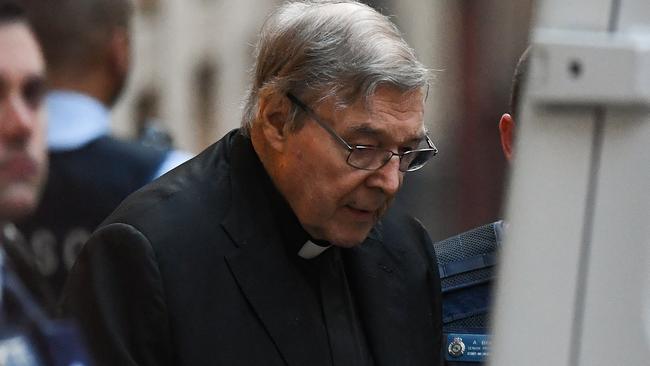Divide over Pell plays into religious freedom debate
The bitterness of old has given way to rancour between faith and secularism in Australia.

In late 1900 a former Australian Test cricketer, Arthur Coningham, brought divorce proceedings, on the grounds of adultery, against his wife, Alice. He named as co-respondent Father Denis Francis O’Haran, secretary to Cardinal Patrick Francis Moran and dean of St Mary’s Cathedral, Sydney. The “criminal conversation” (as legal systems once termed it) was said to have taken place in the cathedral grounds.
There ensued a very divisive public donnybrook — on one side the Catholic Church, on the other hardliners of various Christian denominations, notably Presbyterians and the Loyal Orange Lodge. A priest was suborned, a Catholic postmaster-general interfered with the mails. Eventually O’Haran was pronounced not to be a guilty party.
Much exultation in Catholic circles, much gnashing of teeth by the other parties. Recent scholarly opinion is that O’Haran had indeed sinned.
Bitter tribalism set in, ready to be inflamed further by the conscription referendums 15 years later and the role of a Melbourne archbishop, Daniel Mannix.
When, 118 years later, in December last year a former archbishop of Melbourne was found guilty of sexual abuse of minors, there was the same eruption of glee and dismay. This time the roles were reversed. Catholics generally, and some non-Catholics, were horrified and their opponents were in seventh heaven.
Catholic horror this time was of two kinds. Rejectors of the verdict were outraged that their senior representative should be so hounded. Acceptors felt scandalised and ashamed. My suspicion is the first group, even among non-practising Catholics, was the larger one. My tribe right or wrong.
The intervening century has seen a change in the make-up of the anti-Catholic party. Christian sectarianism is extinct. The denominations, with ever-dwindling adherents, have put aside past differences to make some sort of united stand for religion.
Catholicism, as the largest and most visible of the old denominations, is seen as the representative of Christianity. Its opponents this time are the growing secularist forces. The conviction and sentencing of George Pell is regarded, not without justification, as a grievous blow to the cause of religion. Judge Peter Kidd’s remark in his sentencing of Pell that this was a judgment on an individual, not on the Catholic Church, was necessary because in large sectors of the community it was seen and welcomed as a judgment on the church.
The damnation of Pell is an act with both pure and impure elements, for the widespread animus against him and all he is believed to stand for means there’s a shower of stones being hurled from the sidelines as an accompaniment to the presumed sobriety of the judicial condemnation. Patently the Pell case is a judicial matter, but in public and private commentary it’s much more than that.
It’s a cockpit for tribal and ideological warfare. Of course it’s not a freedom-of-religion issue, but given the times and the timing it bleeds into that. Two religious figures, Pell and Israel Folau, have both lost round one but are now back in the fight for a round two, and very probably a round three. And the general population barracks for one side or another.
Argument over the place of religion in Australian society is not going to go away soon. Discussions over the Coalition’s promised religious rights bill will see to that. Is it too much to hope, however, that tempers might be cooled, that the existence of the colour grey could be more readily acknowledged? For example, anyone hoping for Pell’s appeal to be upheld (as I do) surely has to feel for the other central figure, the young man identified as both victim and complainant.
I’m compelled to believe that something terrible happened to him, that he has nevertheless held his life together in a way one can only admire, that his testifying was an ordeal, and that any eventual clearing of Pell would entail a bitter future for him — to put it at no more than that. One has only to read Louise Milligan’s Cardinal to see the grim days he endured even before a trial was a twinkle in any police force’s eye. But concern for his welfare is not the business of a court of appeal or a high court. Other organisations could attend to that welfare.
A gesture from another corner heartened me. David Marr’s loathing for Pell has frequently been on display. So it was hardly an astutely neutral move for the ABC’s 7.30 and The Drum to invite him to comment on the appeal. Yet the first thing Marr said to Leigh Sales came close to compassion for Pell: a headshaking wonder that he had to appear in handcuffs. Marr’s reports in the Guardian Australiatook the gesture even further; they were analytical reports, not polemics.
At the same time — and fair enough — his ideological sympathies were evident. As though fearing the appeal’s success, he withdrew to a more secure redoubt. While summarising the prosecuting counsel’s performance as producing a train wreck of a day, Marr emphasised that what the silks said was of minor importance compared with how the court appraised all the documentary evidence. Several times he repeated that the Victorian Court of Appeal was at loggerheads with the High Court, which had habitually reinstated guilty verdicts in sexual abuse cases overturned by that lower jurisdiction. A fair and interesting point to make.
Rigidity is not everywhere a virtue. I voted for Labor in the recent election, and the only consolation I took from its defeat was that a guarantee of religious freedom was a far likelier bet under a Coalition government. Bill Shorten and Tanya Plibersek had been evasive to the point of superciliously hostile when questioned about this issue. Fingering the wind in the aftermath of the marriage equality referendum, they calculated the force was with them on this one; there need be no parleying with the religious right.
Four days after the election, Chris Bowen was telling the press “that people of faith no longer feel that progressive politics cares about them. These are people with a social conscience who want to be included in the progressive movement. We need to tackle this urgently.” Anthony Albanese, making the same point, and by way of a significant example of what he meant, cited Labor’s refusal to allow its parliamentarians a conscience vote on the marriage equality referendum. And yes, at the time the Labor leadership, with amused hauteur, dismissed any idea of a conscience vote because, it said, there was only one opinion any intelligent, fair-minded, decent person could hold on that issue. Whereas Albanese’s position was that “I didn’t want anyone to feel that they had to choose between their faith, their religion and their loyalty to the Labor Party”. These words, coming from a leader whose re-election poster for Grayndler read “Progressive, Effective, Ours”, augur well for co-operative parliamentary progress on the religious issue. Animosities, fears and bigotries, however, are not going to disappear.
Superficially the Pell case has nothing to do with religious freedom, but it is anything but a dispassionately conducted and viewed legal process. Some Australians are so wedded to Pell and all that they believe he stands for, that whatever the outcome of the appeal and any subsequent case, they will hear no wrong of him at all. They see the case as religious persecution, opportunistically launched by a rogue police force at a moment of Christian vulnerability as the church staggers from the self-inflicted wounds of its appalling sexual abuse. On the other side there will remain the implacable body of the wider lynch mob, the militant atheist and secularist commentators, waging the old Voltairean crusade “to crush the infamy”. It will be to this background that a national discussion of the place of religion and its freedoms will be played out.
Gerard Windsor is an author and literary critic whose books include the recent The Tempest-Tossed Church: Being a Catholic Today.


